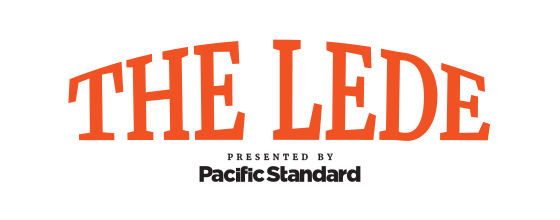Welcome to The Lede

The Lede is a new weekly newsletter giving premium members greater access to Pacific Standard stories, staff, and contributors.
For the rest of the month, The Lede will be openly available. We want to give readers a sense of one part of the exclusive content they will receive as a PS Premium member—in addition to eight print issues, early access to feature stories, data privacy, and ad-free access to our site. All for just $3.99 a month.
Most importantly, memberships help support stories that make a difference.
The Edit
We spoke with Pacific Standard contributing writer Jimmy Tobias about special interest groups, a modern civilian conservation corps, and why the government has little appetite for preserving public lands. Listen to the episode here.
Up Next: Our episode featuring Alli Maloney, writer of the recent story “Henry Green, The Columbus Police, and the Jump Out Boys: How Racism Becomes Institutionalized in Police Departments,” will be available this Monday.
You can subscribe to the podcast on Apple Podcasts and SoundCloud.

Time to Talk About Guns
On Wednesday, a young man strode into Florida’s Marjory Stoneman Douglas high school carrying an AR-15 rifle and gunned down 17 people. Videos, pictures, and text messages from students trapped inside the school spread quickly through social media. The harrowing images illustrated the jarring fear felt by teenagers who hid and hoped while an armed assailant roamed the halls.
An outpouring of shock and outrage soon followed. A reaction that, as contributing editor Jared Keller wrote on Thursday, has become its own vicious cycle of inaction and helplessness. This is because these incidents are becoming more common, not less. This is the 18th school shooting in 2018, and is added to the list of deadly mass shootings including Sandy Hook, Sutherland Springs, Pulse Nightclub, Las Vegas, Charleston, and others.
Pacific Standard has long covered issues around gun violence, the lax culture that has fed into their ubiquity, and sensible gun reforms. In order to participate in the discourse, access to reliable information is crucial. After all, there is a lot of misinformation that makes its way into the discussion. Just last we June, we profiled discredited gun researcher John Lott, who recently appeared on the New York Times‘ op-ed pages.
Pro-gun lobbyists will continue to pump cash into campaign funds to keep legislators at bay. And their position is not strictly partisan, as some might think, as there are those on the far-left who push back against the idea of increased gun control. Florida lawmakers, for example, recently pushed for less gun control in public spaces. Many have pointed to Australia’s notable success in curbing gun violence, but the country’s ambassador to the United States had words of caution about the difficulty of applying lessons from abroad here at home.
The conversation will never be an easy one due to the fact that gun culture is so ingrained in our society, and in the wake of tragedy there will always be people trumpeting the “it’s too soon to talk about gun reform” line in order to kick the can down the road. But through the lens of our coverage of this issue over the years, it’s evident that it’s not “too soon” to have this conversation, as it’s one that is long overdue.

Since We Last Spoke: Bees’ P-Problem
Updates to stories from the Pacific Standard archive.
Bad news for our buzzy friends: A study released in October found that honey from bee populations around the globe appears to be contaminated with a common pesticide. That’s troublesome because, as Josh Dzieza wrote in the January/February 2015 issue of Pacific Standard, even subtle pesticide exposure can weaken bees when it is compounded by two other factors—poor nutrition and pests.
“Weakened by pesticides and malnutrition, bees are likelier to succumb to disease,” Dzieza wrote. “Bees can contend with one or two of the three Ps, but when all three combine it becomes too much.”
The recent study found that 75 percent of honey samples from six continents tested positive for at least one type of neonicotinoid, a pesticide that has been linked to bee colony collapse.
PS Picks
PS Picks is a selection of the best things that the magazine’s staff and contributors are reading, watching, or otherwise paying attention to in the worlds of art, politics, and culture.
The comic-book hero Black Panther was the first of his kind when he was introduced in 1966, when white superheroes reigned supreme. The first black superhero in mainstream comics, Black Panther—whose alter ego is an African king named T’Challa—appeared intermittently in an eponymous series and as a guest star in other series for his first 50 years. In 2016, however, Black Panther suddenly became a breakout star for Marvel: After the hero appeared in the film Captain America: Civil War, Marvel issued a multi-part Black Panther series, A Nation Under Our Feet, written by Ta-Nehisi Coates. This year, T’Challa has a starring role in the film Black Panther, directed by Ryan Coogler and in theaters now.
Starring Chadwick Boseman, Michael B. Jordan, and Lupita Nyong’o, the film has become one of the most anticipated releases of 2018. Its original teaser trailer racked up 89 million views in 24 hours, making it one of the top three most-watched Marvel trailers ever. After footage of the film received a standing ovation at the 2017 San Diego Comic-Con, Coogler offered one idea why it had become so popular. Talking about scoring the footage with a 2017 Kendrick Lamar song, Coogler said, “I think a lot of the cultural things we’re dealing with in Wakanda [T’Challa’s home country] are in the zeitgeist in the African-American community.”
—Kristina Kutateli, Contributing Writer
Adam Rippon is making headlines during these Olympics, and not just for his Bronze medal in men’s figure skating. The athlete spoke with the New York Times at length about his “quiet starvation,” and limiting his diet to only three slices of bread a day to adhere to his standards of body image. “He is willing to talk about his body issues for the same reason that he decided in 2015 to publicly reveal that he is gay,” Karen Crouse writes. “He hopes that by speaking honestly he can help others.” Starting a larger conversation through mass media can help steer or change the minds of younger athletes away from body standards or physiques that might be seen as making for a “better” or “healthier” athlete. This article is one of many that contain more candid discussions of athletes’ histories with eating disorders and the struggles to withstand the pressures of body image within sports, where unhealthy relationships with food can be the norm.
—Candace Butera, Editorial Intern
It took me a while to warm up to Car Seat Headrest, mostly because their name is Car Seat Headrest (specters of my disillusioned older brothers still sneer inside my brain sometimes). But once I heard the cool, insouciant strum that opens the song “(Joe Gets Kicked Out of School for Using) Drugs With Friends“—again: ignore the specters—play loudly over the speakers at some random bar, I knew my skepticism had been ill-placed. “Drugs With Friends,” is one of 12 songs on Car Seat Headrest’s 2016 album Teens of Denial (rise above the specters). I’m not being hyperbolic here when I say that there’s not a weak song on the album. Car Seat Headrest frontman Will Toledo writes starkly honest and ragged lyrics, often laced with skepticism directed at the relationships and lifestyle life rock and roll has promised him; on “Drugs With Friends,” for example, he writes, “Last Friday I took acid and mushrooms/I did not transcend, I felt like a walking piece of shit/In a stupid looking jacket.” It takes some level of cognizance, and certainly paranoia, to ingest a psychedelic and focus only on your own ineptitude; it takes real courage to put that admission in a song.
—Max Ufberg, Digital Director
PS in the News
A look at where our stories and staff surface in the national conversation.
- Alli Maloney’s in-depth look at the institutional racism in the Columbus Division of Police was included in The Marshall Project’s daily newsletter.
- Pacific Standard contributing writer David M. Perry made an appearance on CBC radio to discuss Gerber’s recent decision to choose a “spokesbaby” with Down syndrome.
- “What We’re Reading” from the New York Times included Cassandra Vinograd’s story about the changing stigma around rape victims in South Sudan.
The Conversation
Trump Is Unraveling the Foundational Stitchings of American Scholarship (PSmag.com, February 6th)
- Maybe some scholars are getting all panicky like this article describes, depending on their fields. I’m a historian who focuses on African American, women’s/gender, and disability history. Look up the phrase “the politics of history.” I’ve *always* known exactly how underhanded politicians and others will distort and manipulate the past to try to serve their selfish interests today. This is why I BECAME a historian. You’re giving Trump way too much credit here. —Jenifer L. Barclay
If you have any thoughts about this newsletter or our work—what you like/didn’t like/want to see more of—you can reach us at premium@psmag.com. Become a premium member by following the button below. As we continue to build out the benefits of a premium membership to Pacific Standard, we want to hear what would be most valuable to you.





